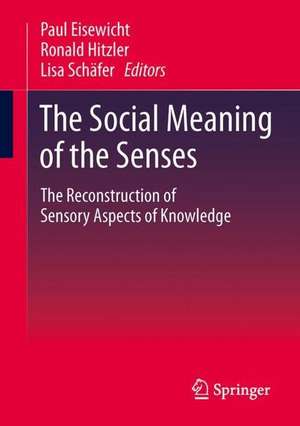The Social Meaning of the Senses: The Reconstruction of Sensory Aspects of Knowledge
Editat de Paul Eisewicht, Ronald Hitzler, Lisa Schäferen Limba Engleză Paperback – 22 aug 2023
The connection between reality constructions and sensory conditions has received little attention in social research so far. This concerns, for example, the use of our sensory organs for empirical reconstructions of bodies of knowledge, sensory perceptions as part of bodies of knowledge, or the question of how far knowledge is dependent on sensory abilities. This anthology attempts to close this gap by focusing on the social significance of sensory perceptions and discussing it using the example of various objects of investigation.
This book is a translation of an original German edition. The translation was done with the help of artificial intelligence (machine translation by the service DeepL.com). A subsequent human revision was done primarily in terms of content, so that the book will read stylistically differently from a conventional translation.
Preț: 524.70 lei
Preț vechi: 617.28 lei
-15% Nou
Puncte Express: 787
Preț estimativ în valută:
100.41€ • 102.83$ • 83.53£
100.41€ • 102.83$ • 83.53£
Carte tipărită la comandă
Livrare economică 18 martie-01 aprilie
Preluare comenzi: 021 569.72.76
Specificații
ISBN-13: 9783658385798
ISBN-10: 3658385790
Pagini: 246
Ilustrații: VIII, 246 p. 28 illus.
Dimensiuni: 148 x 210 mm
Greutate: 0.34 kg
Ediția:1st ed. 2023
Editura: Springer Fachmedien Wiesbaden
Colecția Springer VS
Locul publicării:Wiesbaden, Germany
ISBN-10: 3658385790
Pagini: 246
Ilustrații: VIII, 246 p. 28 illus.
Dimensiuni: 148 x 210 mm
Greutate: 0.34 kg
Ediția:1st ed. 2023
Editura: Springer Fachmedien Wiesbaden
Colecția Springer VS
Locul publicării:Wiesbaden, Germany
Cuprins
The connection between reality constructions and sensory conditions.- The use of our sensory organs for empirical reconstructions of bodies of knowledge, sensory perceptions as part of bodies of knowledge.- The question of how far knowledge is dependent on sensory abilities.
Notă biografică
Paul Eisewicht is a postdoctoral researcher at the Faculty of Social Sciences at the Technical University of Dortmund.
Ronald Hitzler was Professor of General Sociology at the Technical University of Dortmund until 2017.
Lisa Schäfer is a research assistant at the Institute of Sociology at the Open University of Hagen.
Ronald Hitzler was Professor of General Sociology at the Technical University of Dortmund until 2017.
Lisa Schäfer is a research assistant at the Institute of Sociology at the Open University of Hagen.
Textul de pe ultima copertă
That which we consider to be real we call knowledge. As a rule, we consider what our five senses convey to us to be real. Our perception and what we consider real and construct as socially effective differs depending on which senses we focus on and how intensively.
The connection between reality constructions and sensory conditions has received little attention in social research so far. This concerns, for example, the use of our sensory organs for empirical reconstructions of bodies of knowledge, sensory perceptions as part of bodies of knowledge, or the question of how far knowledge is dependent on sensory abilities. This anthology attempts to close this gap by focusing on the social significance of sensory perceptions and discussing it using the example of various objects of investigation.
The publishers
Paul Eisewicht is a postdoctoral researcher at the Faculty of Social Sciences at the Technical University of Dortmund.
RonaldHitzler was Professor of General Sociology at the Technical University of Dortmund until 2017.
Lisa Schäfer is a research assistant at the Institute of Sociology at the Open University of Hagen.
The connection between reality constructions and sensory conditions has received little attention in social research so far. This concerns, for example, the use of our sensory organs for empirical reconstructions of bodies of knowledge, sensory perceptions as part of bodies of knowledge, or the question of how far knowledge is dependent on sensory abilities. This anthology attempts to close this gap by focusing on the social significance of sensory perceptions and discussing it using the example of various objects of investigation.
The publishers
Paul Eisewicht is a postdoctoral researcher at the Faculty of Social Sciences at the Technical University of Dortmund.
RonaldHitzler was Professor of General Sociology at the Technical University of Dortmund until 2017.
Lisa Schäfer is a research assistant at the Institute of Sociology at the Open University of Hagen.
This book is a translation of an original German edition. The translation was done with the help of artificial intelligence (machine translation by the service DeepL.com). A subsequent human revision was done primarily in terms of content, so that the book will read stylistically differently from a conventional translation.
Caracteristici
Interpretative Social Research in the Context of the Material and Sensorial Turns Methodical approaches to the reconstruction of sensory perceptual qualities Senses and corporeality in digitalized worlds
